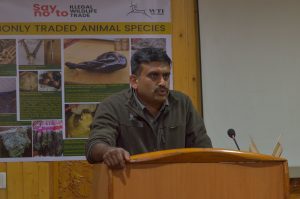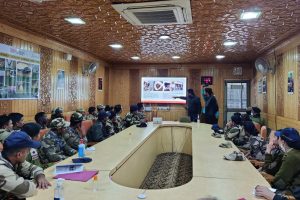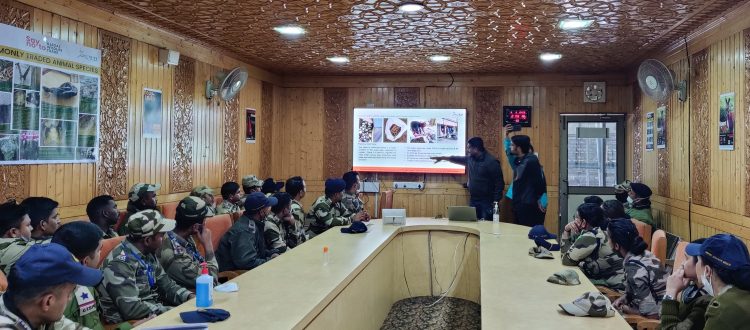Taking illegal wildlife trade off the flight list
An 18-year-old boy, David (name changed) is a frequent flyer. In the last six months, he made more than a dozen trips to Thailand, with only his carry-on backpack. He is not particularly interested in sightseeing and most of his trips had been for less than a couple of days. “When you look at a travel history as such, it does strike you as something interesting, something alarming”, says Jose Louies, chief of enforcement at Wildlife Trust of India.
WTI’s cyber spotters, a team dedicated to identifying and alerting possible illegal wildlife trade had somehow made this breakthrough on David. It were his social media posts that put him in the spotlight and further investigations revealed that David had been an active transporter of star tortoises to South-Asian countries. Protected under Schedule IV of the Indian Wildlife (Protection) Act, 1972 and Appendix II of CITES, these tiny tortoises are in huge demand in foreign markets as exotic pets. In the last six months, David had been able to transport 100s of these endangered reptiles, taking a dozen with him every time. In return, he had made lakhs from his trips.
How did David succeed?
While trade in wildlife such as star tortoises is nothing new, it is worrying how an 18-year-old had been able to avoid questioning for so long. Now that he has been finally apprehended, he explains that it had been as easy as carrying chocolates! Airport security is mostly concerned with articles that present a risk to passengers. A star tortoise, carefully packed in bundles, does not really fit this category, Further; these docile animals do not even show rapid movement under the scanner to push the authorities for further checks.

“There are ways to keep live tortoises immobile”, says David, as he shares his alarming strategies with the enforcement team. Over the years, WTI has been able to gather several such intel and common practices of how wild animals and their parts cross international borders. It is not just about biodiversity loss but also putting a stop to the black market that it fuels globally. In the past, funds (in trillions) from such illegal wildlife trade have funded greater catastrophe. The Boko Haram movement in Africa and the Ulfa rebellion in North East India are stark examples of it.
A step towards tightening airport security
As an organization working on protecting wildlife, countering illegal wildlife trade has been at the top priority for Wildlife Trust of India. Over the last 23 years, we have worked closely with national and international enforcement agencies to conduct more than 1900 such operations. However, a big step towards success would be to tighten airport security, a major gateway to such trade.
To this end, Wildlife Trust of India conducted a capacity-building workshop at Sheikh Ul Alam International Airport, Srinagar, this March. A two-day participatory session, it saw discussions on commonly traded wildlife (both animals and plants) through international borders and the means to identify the same. An SOP was also shared on how to identify such biological materials under the scanner and the steps on further handover.
In the past, airlines like SpiceJet had been helpful in the confiscation of deer antlers from airports like Srinagar. India has a strict policy against illegal wildlife trade but the culprits too keep on innovating. To be a step ahead of them requires vigilance and more importantly, the drive to bring about a change.

Wildlife crime is listed at par with other offenses like narcotics and arms smuggling. The workshop was an effort to highlight the same and bring about awareness among airport enforcement at the degree of crime it matches. According to a CISF Official, “it’s time that we put special focus on wildlife crime that has been ongoing right through our doors. Workshops such as these are definitely the way to start and would help us understand the nuances of illegal trade and thereby the means to stop them”.
Along with the Department of Wildlife Protection, J&K, the team also displayed common wildlife products like shahtoosh wool, leopard bones, musk pods, jackal skin, and other illegal wildlife derivatives that have been known to pass through airport security in the past.
Over the two-day capacity building, WTI and the local forest department oriented about 60 CISF personnel, 5 airline operations staff and 8 wildlife department staff. The event was chaired by Mr. Manish Kumar, CISF Inspector and Mr. Altaf Hussain, Wildlife Warden (Central Division). The team will be conducting more such workshops in the coming days to train airport security staff on various modules of wildlife trade identification, in the near future.
It takes a country to right the wrongs
It is through a collective awareness and effort that we can hope to dismantle the illegal wildlife trade. It will take a whole country to save our natural heritage and allow our wildlife to flourish. To this end, WTI also calls in interested volunteers to join our Cyber Spotter network to help scan through the millions of content that are being uploaded on social media every day and report potential threats. Join us at the Cyber Hawk App.









